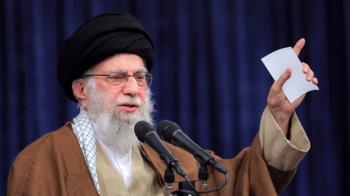Alwaght- While Saudi Crown Prince Mohammed bin Salman's three-week trip to the Western countries was in its last days, the Qatari Emir Sheikh Hamad bin Tamim Al-Thani visited the US. Starting on Friday, April 6, the visit of the Qatari emir first saw him arriving in Tampa, Florida. Sheikh Hamad went directly to a military base in the American state and met with the senior American commanders with whom he discussed the expansion of military cooperation between the two allies. Qatari Emir's trip is important as it is taking place after Rex Tillerson, a pro-Qatari man in Trump administration, was dismissed as the US Secretary of State and also bin Salman, in quest for broader Western support at home and abroad, has visited Washington as part of trip that started from mid-March and also took him to Britain, France, and Spain.
Escaping isolation
Saudi Arabia, the United Arab Emirates, Bahrain, and Egypt imposed a blockade on Qatar in June last year. The anti-Qatari steps involved measures like cutting diplomatic relations with Doha and imposing on the small Arab emirate a full-scale air, sea, and land siege. Recently, some Saudi newspapers unveiled the Riyadh’s intention to start a canal project that will totally separate Qatar from the Persian Gulf Arab neighbors by making Qatar peninsula an island. The new canal, 60- kilometer-long and dubbed Salwa Canal, will start from Salwa region of Saudi Arabia to Khor al Adid along the eastern coasts of the kingdom, where the land borders make Saudi and Qatari territories meet.
Qatar's independent policies and refusal to bow to Saudi regime’s dictations have effectively caused Riyadh's push for punishing Doha using a set of sanctions.
Upon the Arab ban, which largely targeted the Qatari imports, Doha broadened ties with Iran and Turket, an arrangement that effectively nullified the Saudi-led punitive measures. Not long after the embargo imposed, Qatar’s emir traveled to Russia to meet the Russian President Vladimir Putin. The Russia visit was regarded was meant to involve Moscow, a power in rivalry with the US for a toehold in the significant West Asia region, in the Persian Gulf crisis. He was successful in getting the Russians on board.
And now the emir of Qatar wants the Americans to use their weight and help lift the embargo. Since the eruption of the Arab diplomatic crisis, the US President Donald Trump stood on the Saudi Arabian side. It was under pressures from the former Secretary of State Tillerson that avoided anti-Qatari steps in Riyadh appeasement. Now Trump has designated Mike Pompeo, the former CIA chief and a zealous supporter of Saudi Arabia, to fill Tillerson's post, causing Qataris to grow serious concerns and thus seek the favor of the US administration.
The State of Qatar signed a security agreement with NATO at the alliance's headquarters in Brussels on 16 January, 2018. The pact for security cooperation was signed in the presence of Sheikh Tamim and NATO Secretary-General Jens Stoltenberg after their meeting in Belgium. According to the pact, Qatar will allow the 29-member NATO to enter its territories and use the al-Udeid Airbase southwest of Doha. In a statement published on its website, NATO said that Stoltenberg and the Qatari leader during the meeting discussed the regional developments and NATO-Doha partnership.
Doha's eyes on Washington patronage
Qatari emir is fully aware that Trump policy is influenced by money offers and business opportunities. He knows that Trump extended his support for Riyadh’s stances and policies after earning billions of dollars from arm deals with Saudi rulers. Indeed, Saudi crown prince won Trump’s support only after sealing a deal of $500 billion military purchases with Washington. The US President even tried to blackmail the Saudis in Syria case just recently, saying that if Riyadh wants Washington to stay in Syria, it has to pay for the costs. The comments came after the US leader said American forces will withdraw the crisis-hit country “very soon.”
So, the Qatari emir is in efforts to reduce the massive US backing to Saudis using military deals with Trump administration. In the present conditions, Trump is capable of ending the Persian Gulf inter-Arab crisis. But he, many believe, will not do so, because as long as the row unfolds, the US benefits from tremendous military deals with the Arab regimes. The US focus now is on directing the course of developments, to make sure things will not go in a way risky to the Washington interests.
Therefore, beside warmly receiving bin Salman and signing huge military deals with him, Americans also well received Qatari emir and sealed big weapons deals with him. According to Washington Post newspaper, during the latest visit, the US approved $300 million of guided missiles for Apache combat helicopters. Shortly after this deal was given publicity, White House authorized sale of $270 million worth of arms and military facilities to the UAE, which is one of the blockading countries.
Last summer, Pentagon had sold Qatar 36 F-15 fighter jets worth of $12 billion. Qataris have been doing their best to keep hosting the US military base on their soil which is costly to Doha but allegedly guarantee Qatar’s security against any Saudi aggression.
The analysts hold the idea that once Pompeo takes the office as Secretary of State, the US will bolster its backing for Saudi Arabia against Qatar. Sheikh Tamim, aware of this, has tried to buy the continued American support by financial privileges.
Qataris are also worried about bin Salman’s struggle to garner Western legitimacy using military deals with Western capitals, Washington, London, Paris, and Madrid. One of the factors foiling the Saudi crown prince’s anti-Doha plans is a failure to have the European allies on board. Qatar’s leader wants reluctance of Europeans to support the Saudi agenda against his country continue by spending petrodollars on military purchases.
Additionally, Qatar is a valuable card for Americans who do not afford losing the tiny state to the rival Russian-led camp just because of its rifts with Riyadh. After all, Doha is geopolitically crucial for the US. Gardiner Harris and Mark Lander in a co-written article which was published by the New York Times, have reported that Qatar is host to al-Udeid Air Base, which is home to nearly 10,000 American troops and is the overseas headquarters for United States Central Command that would launch airstrikes against Syria.
The US administration's double-faced approach of stems from Trump’s policy of fueling disputes between the wealthy Persian Gulf Arab states rather than a contradictory foreign policy in relation to the (Persian) Gulf Cooperation Council crisis.



























